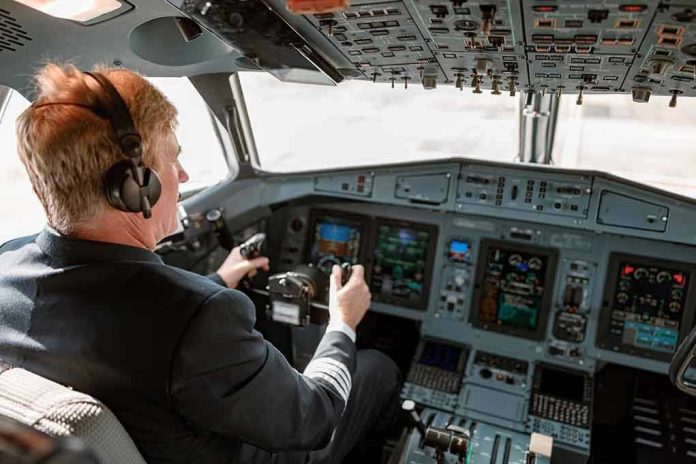
A former Alaska Airlines pilot who nearly caused a catastrophic mid-air disaster while under the influence of psychedelic mushrooms has received what many victims are calling a shockingly lenient sentence that raises serious questions about aviation safety accountability.
Story Highlights
- Joseph Emerson attempted to shut down engines mid-flight while under influence of psilocybin mushrooms, endangering 83 lives
- Received only probation, community service, and restitution despite potential for mass casualties
- Incident exposes dangerous gaps in pilot mental health screening and cockpit access protocols
- Victims express outrage over lenient plea deal that fails to reflect severity of endangering commercial flight
Reckless Actions Nearly Caused Aviation Disaster
Joseph Emerson’s attempt to cut fuel to both engines of Horizon Air Flight 2059 represents one of the most dangerous cockpit incidents in recent aviation history. While riding as an off-duty pilot in the jump seat, Emerson tried pulling the engine fire suppression handles during the flight from Everett, Washington to San Francisco. His actions stemmed from sleep deprivation exceeding 40 hours and lingering effects from psilocybin mushrooms consumed two days earlier. Only the quick intervention of the flight crew prevented what could have been a fatal crash involving over 80 passengers and crew members.
Legal System Delivers Inadequate Consequences
His plea agreements resulted in sentences that many consider insufficient given the potential consequences. Emerson pleaded guilty to federal charges of interfering with a flight crew and no contest to state charges including endangering an aircraft and 83 counts of reckless endangerment. His punishment includes five years’ probation, 664 hours of community service, and $60,000 restitution. The sentence also prohibits him from approaching within 25 feet of aircraft without approval and bars controlled substance use without prescription. Victims voiced strong dissatisfaction with the perceived leniency, arguing the punishment fails to match the severity of nearly causing mass casualties.
Aviation Safety Protocols Require Immediate Reform
This incident exposes critical vulnerabilities in aviation safety systems that demand immediate attention from regulators and airlines. The case highlights dangerous gaps in pilot mental health screening, particularly regarding substance use and psychological fitness for cockpit access. Current protocols failed to prevent a drug-impaired individual from accessing flight controls during a commercial operation. The incident recalls the 2015 Germanwings crash, where pilot mental health issues resulted in deliberate mass casualties, underscoring the urgent need for enhanced screening procedures.
Emerson’s expressed remorse and founding of a pilot mental health nonprofit cannot overshadow the fundamental safety failures this case represents. Airlines and the FAA must implement stricter cockpit access controls, enhanced drug screening, and comprehensive mental health evaluations to prevent similar incidents. The aviation industry’s responsibility to protect passengers requires accountability measures that match the gravity of endangering commercial flights, not lenient plea deals that minimize potentially catastrophic consequences.
Sources:
Ex-pilot accused of trying to cut passenger flight’s engines reaches plea deals, lawyer says
Former Alaska Airlines pilot who tried to shut down engines mid-flight pleads guilty
Joseph Emerson, pilot who tried to cut engines mid-flight, pleads no contest to state charges



